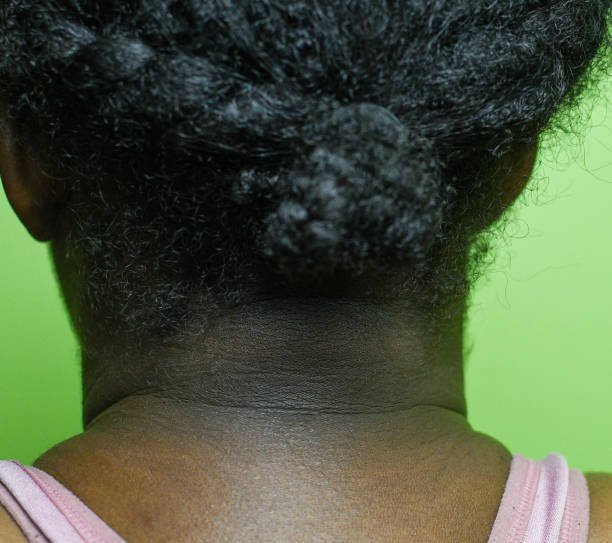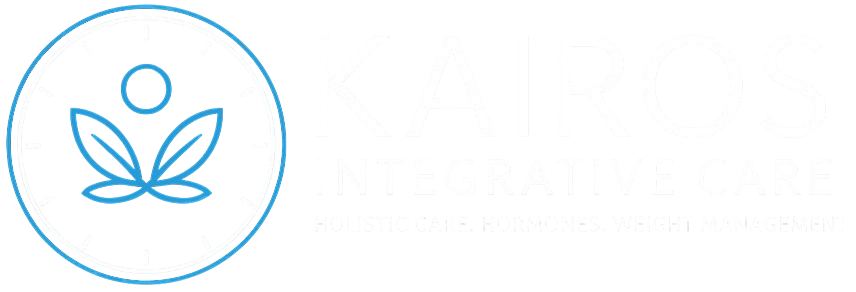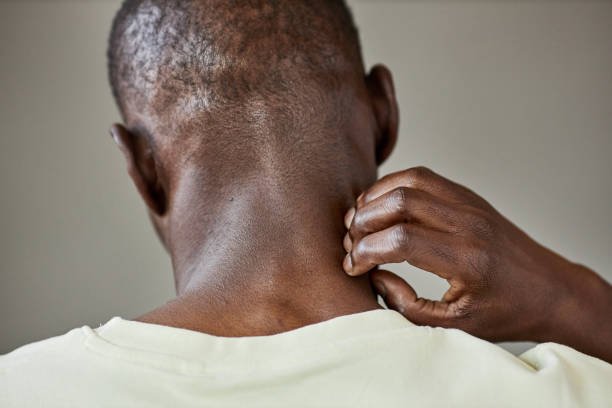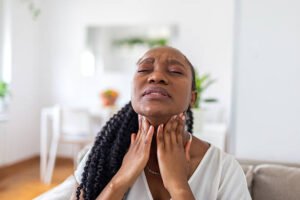Have you looked in the mirror and noticed the skin on your neck looking darker, thicker, or almost velvety in texture?
Perhaps you’ve tried scrubbing, exfoliating, or even using skin-lightening creams to remove it, only to find that nothing changes. This skin condition is more common than you think, and it has a name: acanthosis nigricans.
At Kairos Integrative Primary Care, we believe your body gives subtle signs when something’s off, and darkened skin around the neck is one of them. Rather than viewing it as a cosmetic concern, we see it as a clue that your metabolic health may need attention.
What Is Acanthosis Nigricans?
Acanthosis nigricans is a condition where the skin becomes visibly darker, thicker, and sometimes velvety, most commonly around the neck, underarms, groin, or even on the knuckles and elbows.
It isn’t contagious or dangerous on its own, but it might be a visible sign that something deeper may be happening inside the body.
But while the skin itself isn’t the problem, what it represents could be. It’s often a sign that your body is struggling with elevated insulin levels or other hormonal imbalances that impact how your cells process sugar and energy.
Why Does the Skin Around the Neck Darken?
One of the most common causes of dark skin around the neck is insulin resistance. This happens when the body produces insulin, but cells don’t respond to it properly. As insulin levels climb, they activate skin growth receptors that produce excess pigment and thickened tissue, especially in areas with natural folds.

Studies continue to show strong links between this skin change and underlying metabolic shifts. In fact, a 2023 study found a significant connection between acanthosis nigricans and early markers of prediabetes and PCOS in adolescents.
It’s your skin’s way of saying, “Something deeper is happening.”
Conditions Commonly Linked to Acanthosis Nigricans
Acanthosis nigricans is not a diagnosis itself, but it’s usually a sign that something else is going on in the body. Some of the most common causes include:
- Polycystic ovary syndrome (PCOS)
- Obesity, particularly belly fat
- Hormonal shifts during puberty, pregnancy, or menopause
- Hypothyroidism or other thyroid disorders
- Genetics or family history of diabetes
- Certain medications, like steroids or hormonal birth control
If you or your teen has noticed darkened skin around the neck along with fatigue, mood changes, or weight shifts, it might be time to evaluate deeper metabolic function.
Why It’s Not About Hygiene
We hear it often: I thought it was dirt, or I kept scrubbing, but it never faded.
The truth is, acanthosis nigricans is not caused by poor hygiene. Scrubbing won’t remove it. Skin creams won’t cure it. Because the pigmentation isn’t superficial, it starts from within.
Many women, teens, and even children carry a sense of shame or frustration around these symptoms. Our goal at Kairos is to remove the stigma and guide you to answers with compassion and science.
Why Early Detection Matters for Your Long-Term Health
Acanthosis nigricans is often one of the earliest signs that something deeper may be affecting your body.
If ignored, the underlying issues, like insulin resistance, can lead to:
- Type 2 diabetes
- Cardiovascular disease
- Infertility (especially in those with PCOS)
- Chronic fatigue and inflammation
Because these changes show up on the skin first, it’s your body’s early warning signal, giving you a chance to act before more serious health problems show up.
How We Treat Acanthosis Nigricans at Kairos Integrative Care
We don’t treat the skin. We treat the why. At Kairos, our root-cause approach involves:
Advanced Lab Testing
We begin with a detailed evaluation of your insulin, blood sugar, thyroid function, reproductive hormones, inflammation markers, and more. This helps us see the whole picture, not just isolated symptoms.
Personalized Nutrition & Lifestyle Care
We help you build a nutrition plan that stabilizes blood sugar, reduces inflammation, and supports gut health. This may include targeted anti-inflammatory foods, fiber, and blood-sugar balancing meals.

Herbal & Natural Supplement Support
Depending on your labs, we may recommend natural options like inositol (for PCOS), magnesium (for insulin resistance), or berberine, which has been shown in clinical studies to improve insulin sensitivity.
Ongoing Monitoring & Adjustments
We don’t set it and forget it. Your body changes over time, so your care plan should too. We walk with you every step of the way.
Schedule Your Appointment Today
We proudly serve families in Houston, Sugar Land, and surrounding areas, including zip codes 77046 and 77478.
We accept most major insurance plans:
- Blue Cross Blue Shield
- Aetna
- Cigna
- UnitedHealthcare
- Tricare
- Texas Children’s
- Memorial Hermann
- Ambetter
Final Thought
When the skin on your neck darkens or thickens, it might be your body’s way of asking for help. These early signs can point to shifts in blood sugar, hormones, or metabolism that deserve a closer look.
If you’re ready to understand what’s actually going on, Lola at Kairos Integrative Care is here to support you. She’s one of our Board-Certified Nurse Practitioners with advanced training in hormone health, functional medicine, and root-cause healing.
Book your appointment today and let’s take the next step together toward better health.




